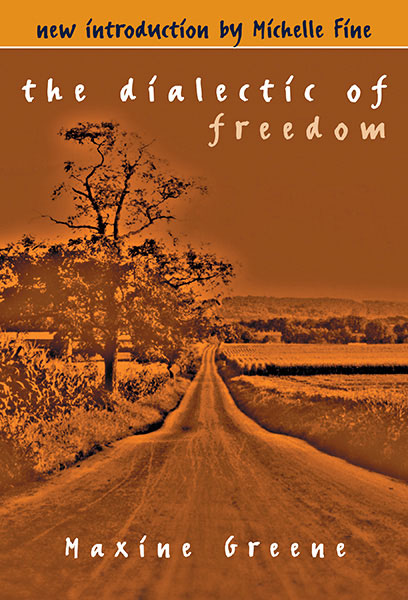Professors: Request an Exam Copy
Print copies available for US orders only. For orders outside the US, see our international distributors.
Publication Date: April 16, 2018
Pages: 168
Series: John Dewey Lecture Series

Special 2018 Edition
From the new Introduction by Michelle Fine, Graduate Center, CUNY :
"Why now, you may ask, should I return to a book written in 1988? Because, in Maxine's words: 'When freedom is the question, it is always time to begin.'"
In The Dialectic of Freedom, Maxine Greene argues that freedom must be achieved through continuing resistance to the forces that limit, condition, determine, and—too frequently—oppress.
Examining the interrelationship between freedom, possibility, and imagination in American education, Greene taps the fields of philosophy, history, educational theory, and literature in order to discuss the many struggles that have characterized Americans’ quests for freedom in the midst of what is conceived to be a free society. Accounts of the lives of women, immigrants, and minority groups highlight the ways in which Americans have gone in search of openings in their lived situations, learned to look at things as if they could be otherwise, and taken action on what they found.
Greene presents a unique overview of American concepts and images of freedom from Jefferson’s time to the present. She examines the ways in which the disenfranchised have historically understood and acted on their freedom—or lack of it—in dealing with perceived and real obstacles to expression and empowerment. Strong emphasis is placed on the focal role of the arts and art experience in releasing human imagination and enabling the young to reach toward their vision of the possible.
The author concludes with suggestions for approaches to teaching and learning that can provoke both educators and students to take initiatives, to transcend limits, and to pursue freedom—not in solitude, but in reciprocity with others, not in privacy, but in a public space.
Maxine Greene (1917–2014) was the William F. Russell Professor in the Foundations of Education (emerita) and professor of philosophy and education (emerita), and the founder and director of the Center for Social Imagination, the Arts and Education at Teachers College, Columbia University.
“Greene triumphs in her search for a critical aesthetic to inform education.”
—Harvard Educational Review
“It is a book that deserves to be read by all who teach.”
—Journal of Aesthetic Education
“This beautifully written book shows us a tough progressive at work.”
—Teacher Magazine
"Why now, you may ask, should I return to a book written in 1988? Because, in Maxine's words: 'When freedom is the question, it is always time to begin.'"
—From the new Introduction by Michelle Fine, Graduate Center, CUNY
Professors: Request an Exam Copy
Print copies available for US orders only. For orders outside the US, see our international distributors.